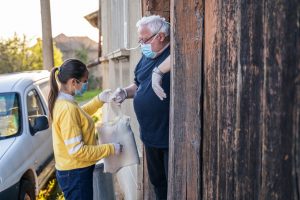Ethics are about more than just following rules in social services. At their core, they are about respect; the basic decency that all your clients and patients deserve from someone in your position, a representative of the society that has, in other ways, let them down. You offer respect automatically to your fellow community members, but also reciprocate the respect they have for you by what you do every day.
Ethical standards represent a code of conduct that promises every individual you encounter gets that respect… respect for their opinion, their privacy, their wishes. Ethical behavior sets a standard for respect that makes your job easier if you follow it, and a soul-sucking impossibility if you don’t.
COVID-19 has thrown many of the usual approaches to maintaining those ethical standards into the shredder, though. Even as the demands for social services have skyrocketed with historic rates of unemployment, families strained by quarantine and financial troubles, and even the infected individuals themselves, the resources available to social workers have diminished and the techniques they rely on have been taken away from them by basic precautions.
That’s turned ethical concerns into a minefield for COVID-era social work. Social workers today are having to grapple with six big concerns to maintain their ethical standards and continue to show every client the respect they deserve.
1. Current Ethics Rules Were Written for a Different World

In more normal times, social workers might run into ethical quandaries from time to time, but for the most part, the answers could be found in rules and guidance set out by NASW and state health departments that were written specifically for those sorts of situations.
Those frameworks didn’t have COVID-19 in mind. States have been scrambling to put together revised guidance to accommodate the realities of social work during a pandemic, figuring out new and appropriate standards for everything from licensing to dealing with confidential healthcare information about a highly infectious disease.
But that guidance hasn’t always lined up well with the actual situation on the ground. Social workers are having to fall back on their own judgement and capabilities more than ever, according to an International Federation of Social Workers Survey conducted in early May of 2020. In many cases, that means throwing out the rules and relying on the ethical principles that drew them into social services in the first place.
Whether it’s violating workplace health and safety regulations to lower your mask and show clients a friendly face, or making hard choices about who receives what services, the difficult decisions today are falling onto social workers themselves rather than the pre-pandemic rulesets.
2. Communications Roadblocks to Assistance

Simply reaching out to both old and new clients hits an obstacle almost immediately with state and local restrictions on in-person contacts in many parts of the country. Social workers deal with disadvantaged populations that don’t always have all the access to the kinds of modern technology that are keeping the rest of us connected today: cell phones, the internet, or even landlines. And the fact is, even some social workers, forced to operate alone from their homes as offices closed, don’t always have the best connections or resources.
And since NASW ethics standards call for informed consent before using technology in such services, some workers found themselves in a catch-22… unable to ethically provide remote services without obtaining in-person consent, but unable to obtain in-person consent due to the pandemic.
When it’s against the rules to visit clients in-person, but you know that they will suffer without your services, it creates an ethical dilemma of the first order. But social workers have risen to the occasion, sometimes by using personal networks to reach clients through friends or relatives with phones or internet, or by taking to new social networks and chat programs like WhatsApp.
3. Privacy and Security Concerns Explode With Online Interactions

But the new tools themselves can present an ethical dilemma. Stringent privacy and confidentiality standards can’t always be upheld when using technologies that were never designed to provide those protections. One surveyed social worker reported a client dropping out of a social media chat when he realized that the standard scrolling log was creating a record of the entire conversation, one that could potentially be leaked online.
It’s up to social workers to figure these dilemmas out, through self-education and the adoption of new technologies and tools like Signal, a texting service that is encrypted and will not share or leak personal information. It’s a tough time to simply keep up with the normal volume of work but social workers are devoting their personal time to figuring out new solutions to assure clients of their privacy while maintaining a standard of care.
4. Rapport and Empathic Connections Suffer Online and Behind Masks

When clients do have cell phone and internet access, it’s possible to contact them… but gaining their trust and expressing empathy is that much harder when you can’t connect in person. Even when site visits are possible, they are happening behind masks, with the all-important facial expression hidden and even a sympathetic tone of voice muffled.
Social workers in hospitals, dealing directly with COVID-19 patients, have had to bear the brunt of this challenge. Discussing end-of-life care and providing palliative support from behind infection control barriers and procedures can make the entire process seem cold, distant, and impersonal. It’s a problem for social workers trying to read their clients as well.
It can be hard enough to suss out complex interpersonal situations in cases of domestic abuse even when visiting a home where it’s happening; when the only contacts are by phone or email, it can be almost impossible to decipher the subtle signals that tell social workers when clients are in danger.
Now more than ever, words and actions are required to bridge the gap. A rapport through listening and genuine understanding is possible, using all the people skills, sensitivity and intuition you’ve developed over your lifetime to show clients that you care.
5. Personal Protection Can Be At Odds With Effective Service Delivery

Social work has become a high-risk job during COVID-19 simply due to the high numbers of individual contacts that are made during the course of the average day. But in a country that hasn’t been able to provide enough personal protective equipment even for front-line doctors and nurses at times, social workers have sometimes been asked to conduct unsafe on-site services without adequate protective equipment.
These situations are always a hard call, but NASW standards point out that self-care is a critical part of delivering effective service as well. If you become compromised by becoming infected, then not only do you put your other clients at risk, but you also take yourself out of a position where you can provide any help at all. Social workers have had to learn to step back from risky activities, even if they could do some good, because doing so would reduce their ability to perform the job in the long run.
6. Providing Continuity of Care May Be Impossible

The ethical codes foresee all sorts of possible problems with standards that are overcome by individual difficulties, and they backstop the issues with another standard: the duty to provide continuity of care by establishing other arrangements.
The problem today is that all agencies and all methods of offering welfare services are strained to the maximum or are unavailable. You may not be able to find an emergency backup for yourself in the event that you become sick or unable to respond for other reasons… a cardinal sin in normal practice, but all too common today.
Social workers have had to prioritize as never before to make sure that the most at-risk members of society receive the services they need, while others may simply have to wait. The act of triage is always heart-wrenching, whether performed by doctors in the ICU or social workers on the street, but it is, at heart, an ethical choice: protecting and providing for the weakest and most in need.
There’s no question that COVID-19 is providing unprecedented challenges to social workers worldwide. American social workers have the good fortune at least to be able to fall back on some of the best educational standards in the world, and that kind of training and information gives them the ability to cope with ethical dilemmas with compassion, innovation, and dedication.
The kind of ethical training you receive in a university-level social work program puts you through exactly the kind of theoretical dilemmas that have now become real, equipping you to make decisions that both you and your clients can live with.
One thing you learn fast in the field of social work is that respect becomes not only one of your most important values, but also one of your most critical tools. The word pops up all over the NASW (National Association of Social Workers) Code of Ethics; you must have respect for individuals, for cultures, for beliefs, for the law. And by offering respect, you come to learn, you will also be more likely to receive it.
In all the hundreds of interactions that your average client has with authority and assistance providers, how often are they simply a number, an impediment to some functionary looking to punch a ticket before going home for the night to a house, warm meal, and friendly family?
Social workers who break past that barrier, who treat their clients with the individual attention and respect they deserve, receive that kind of respect and cooperation in return.





